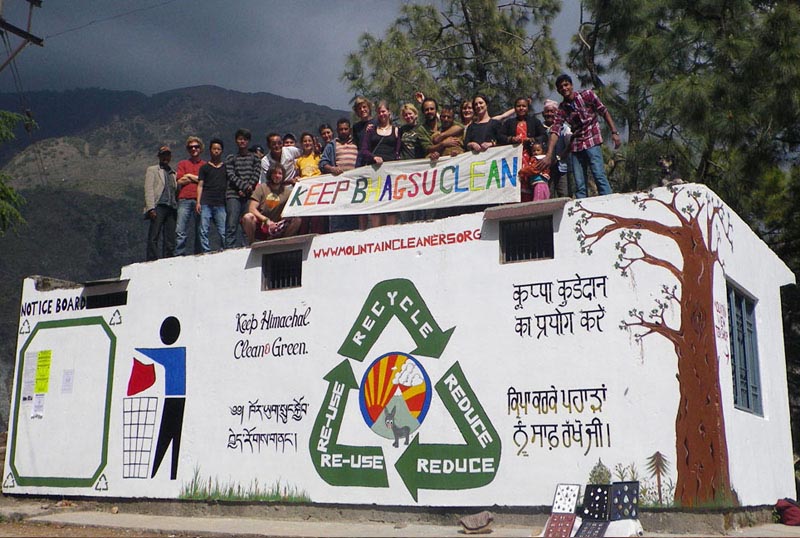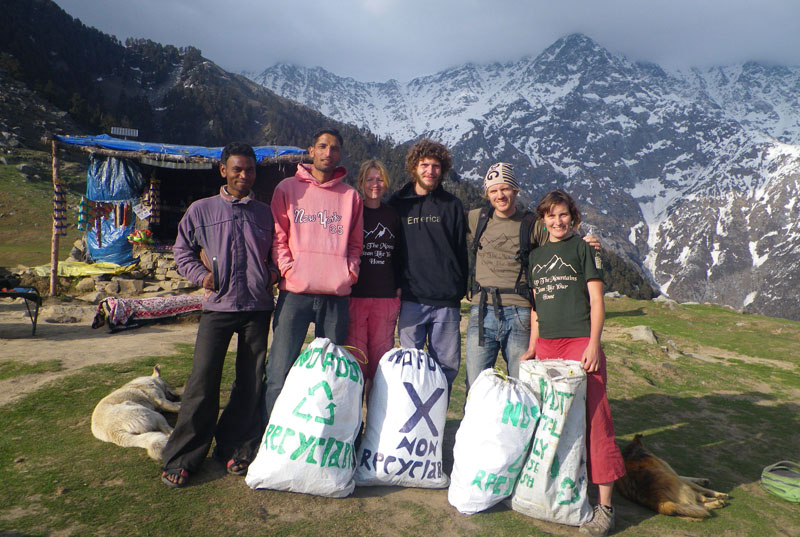 Dharamshala: - This is part two in a series of three articles called Cleaning Up Dharamshala - When Garbage Builds Bridges. In the spirit of World Environment Day on June 5, The Tibet Post International explores the pioneering waste management projects taking place in His Holiness the Dalai Lama's town of residence, McLeod Ganj. For a more detailed introduction, see Cleaning Up Dharamshala - When Garbage Builds Bridges. To read the first article, click here.
Dharamshala: - This is part two in a series of three articles called Cleaning Up Dharamshala - When Garbage Builds Bridges. In the spirit of World Environment Day on June 5, The Tibet Post International explores the pioneering waste management projects taking place in His Holiness the Dalai Lama's town of residence, McLeod Ganj. For a more detailed introduction, see Cleaning Up Dharamshala - When Garbage Builds Bridges. To read the first article, click here.
I have been promised a ride to the local dump site by the Clean Upper Dharamshala Project (CUDP) to see for myself where the worst-of-the-worst garbage, the non-recyclables, find their final resting place.
The garbage truck picks me up in the middle of the chaotic morning traffic of McLeod Ganj's narrow market streets. Quickly, I climb onboard the truck and say hello to the Green Workers who operate it.
43 year old driver, Jigmey Dorjee, has been working with the Tibetan run CUDP for the past 8 years and judging by his relaxed attitude he seems comfortable in his position. So does his Indian counterpart Preetam who is half Jigmey's age but only one year his junior as a CUDP Green Worker.
In the back of the truck is a full load of "wet" waste, collected by the Green Workers directly from households, businesses and institutions around McLeod Ganj. The waste has been segregated leaving only non-recyclable items for the dump-site.
Divine Delivery
As we navigate the hair-pin bends of the mountain roads, Preetam hangs out the window to check for close encounters, while Jigmey, in perfect Hindi, patiently tells the holy cows to move out of his way.
Taking my eyes off the scenic snow-clad Himalaya peaks, I notice several images of Hindu gods and the Buddha on the dashboard. Jigmey, who is originally from Bhutan, explains with a smile; "my gods, his gods" and points from himself to Preetam who is joking with a friend over the phone.
The two of them communicate with only a few words as we approach the dump site on the outskirts of lower Dharamshala. On the site, a handful of men are picking through the smelly debris, looking for plastic-bottles and other recyclable items to sell.
Among the motley crew, a pack of dogs are also prodding the trash, looking for scraps of food. Cakes of cow-dung tell their own story and the flies are swarming everywhere. A ragged man sips on a beer and automatically asks for a cigarette as the truck grinds to a halt.
Hell On Earth?
While Jigmey and Preetam tip off their load over the edge of the site, I get out onto the layers of garbage and realize a little concerned that the ground is wobbly to stand on - like a sea of thickly flowing trash with smoke around the edges from little fires.
Here are all sorts of familiar items; ball-pens, lighters, broken buckets, wrappings, half a radio, an old broom and thousands of other odd left-overs from a modern lifestyle. The whole place stinks and I find myself more than happy to leave again when Jigmey starts the truck after a quick cigarette break with the guys on the dump site.
Feeling heavy from the sight, I soon forget my worries, however, when Jigmey spots a fancy car on the road, littering from its tinted window. He shouts at it from his high-up seat, like a schoolmaster to a naughty child and I am more than just amused; I am impressed with his dedication. "Maybe there is hope still" I reflect as we return to McLeod Ganj.
Promisingly, others have also joined the the CUDP's efforts to clean up around His Holiness' headquarters. An international group, called the Mountain Cleaners, appeared on the scene in 2009 when the founder, 35 year old Jodie Underhill, and some of her friends decided to take on the daunting task of cleaning up the litter-strewn trekking paths around the area.
A twenty minute walk from McLeod Ganj lies the once sleepy village of Bagshu - now a booming tourist town with hotels and restaurants on every corner. It is in Basghu that the Mountain Cleaners recruit a lot of their volunteers, and it is also here that I meet with Jodie in a cafe, to find out who these self-established cleaners are, and what they think of the miserable sight I saw at the dump-site.
The Volunteer Path
Jodie's smallish frame belies the strength of her engaging eyes and the force with which she conveys her views. She tells me her story: "I lived in a really dreary little village where kids had smashed the phone box, there'd be dog-muck everywhere and nobody'd say hello to each other", Jodie says in her strong Northern English accent.
But Jodie and some of the villagers formed a group to save the local community centre and got people together through social events and communal activities. She shakes her head; "in the beginnning they all thought I was mental, but now they are doing stuff they never thought was possible!" she says and adds very convincingly "I am a big fan of the volunteer sector".
Keeping It Clean
Besides Jodie who is the unpaid director, the Mountain Cleaners has 3 salaried staff - Manu, who is from the area, Thinley from Tibet and Lok Man from Bengal who is in charge of emptying dustbins and collecting recyclables in Bagshu.
Between them they run the weekly clean-up trips with the volunteers and organise well attended children's and community education events. "I've got the best team I could ever wish for in all the world" Jodie beams.
Through a long-term effort, and with help from hundreds of volunteers, the Mountain Cleaners have turned Triund, McLeod Ganj's popular, high-altitude trekking spot, into a role model for tourist destinations, laboriously collecting and transporting every piece of non recyclable waste down to the CUDP's containers with mules carrying the heavy loads.
They pass on high value recyclables such a bottles and metal to local rag picker Gudo Devi and the lower value items to the local scrap dealer or the CUDP segregation centre in McLeod Ganj. All of these items will be sent to Punjab for recycling.
These days at Triund, the chai-shop keepers are overseeing that visitors don't litter the ground, but only a few years back things were quite different.
In fact, on World Environment Day, Mountain Cleaner Manu told me that he used to work on Triund when there was no waste management system and every business had a dumpsite. "I also had one" he said, "but now, everyone is collecting the garbage and there are no dumpsites up there anymore. Amazing, isn't it?"
Influential Tourism
Jodie tells me, "I get emails from all over the country saying please come to my place, I've seen Bagshu it's much cleaner, can you come here?". But she is not about to leave the Mountain Cleaners behind. "If I spread my work out too much I can't make it sustainable, you only get one chance, you have to make it work."
Several hotels and restaurants in the area are displaying the Mountain Cleaner's English-language leaflets made of recycled paper from the CUDP's workshop. I question her about the sustainability of having tourists clean up everybody's mess, but Jodie reassures me, "It was never meant to be about foreigners cleaning up, that's not why it started. It is about us all working together."
She continues, "with the tourists we actually have some influence, which is why a lot of our work is targeted at them. What happens then is that the locals see all these people getting involved and now we are getting quite a few Indian volunteers, which we have never had before."
In It For The Long Run
Even in the face of obvious success, however, my inner sceptic won't give up. I tell her that I keep seeing heaps of garbage in all the wrong places and that my land-lord simply pointed at a pile of ashes on the lawn, when I asked him where the nearest container was. "Don't you ever feel discouraged when you do the clean-ups?", I ask her mischieviously.
"Look", she says plainly, "I'm not going to just clean up and say, oh what a lovely job we've done. I'm a realist, that's going to be dirty in a weeks time. We do clean-up's to raise awareness and highlight the need for change."
But in the big picture every little help is valuable she explains, "I see it like the ocean is made of tiny little droplets of water and individually they are nothing, but put them all together and there is nothing more powerful."
I try a different angle and ask her what will happen when, eventually, she leaves? "This is the first time in my life that i have been somewhere and thought; I don't want to go, my work is really not done here" she replies and adds laughingly, "they'll be carrying me up to Triund on a donkey before I quit this for sure!"
The waiter arrives with our food and I take the opportunity to re-organize my thoughts. I have yet to tell her about my experience at the dump site and surely there must be something more critical I can ask her. Suddenly I remember the big question: Where are the bins!?
Will Jodie reveal the mystery behind the missing bins? And what will she think of the dump site? Join the TPI again next week for the last episode of Cleaning Up Dharamshala - When Garbage Builds Bridges, where we will also talk to Mountain Cleaners Manu and Thinley about the cultural problems related to working with garbage.


![Tibet has a rich history as a sovereign nation until the 1950s when it was invaded by China. [Photo: File]](/images/stories/Pics-2024/March/Tibet-Nation-1940s.jpg#joomlaImage://local-images/stories/Pics-2024/March/Tibet-Nation-1940s.jpg?width=1489&height=878)
















